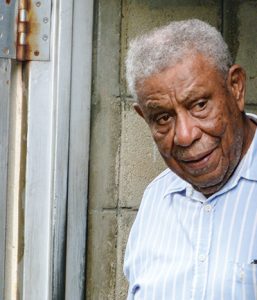Decision on submissions in Nigerian woman’s case is set for Friday

Nigerian/Vincentian Eunice Dowers has argued that she should not have a case to answer, that the evidence against her is tenuous, as it relates to charges of taking possession of businessman Bertille ‘Silky’ DaSilva’s credit card.

The prosecution closed its case last Thursday in the trial of the former Star Garage Ltd employee who has been charged 55 times in relation to the alleged unauthorized use of her former boss’ credit card and cheque book between August 1, 2018 and January 31, 2019.
Dowers has 17 charges of theft, 14 charges of taking possession of the credit card of DaSilva, 14 fraud counts, and 10 money laundering charges to defend.
The case, presented by crown counsel Rose-Ann Richardson, involved evidence from the bank, the First Caribbean International Ltd; employees/former employees of Star Garage; and police investigators. The prosecution contends Dowers did not have permission to use the company card/cheque book belonging to DaSilva.
However, on the opposite side, counsel for the defence, Grant Connell, engaged in lengthy cross examinations of the prosecution witnesses, including grilling them on a possible intimate relationship between ‘Silky’ and Dowers, one in which the 24-year-old married woman allegedly received financial assistance from him.
The case was set to continue yesterday, February 22, at which time Connell submitted, “that the defendant should not have a case to answer, because the evidence thus far is tenuous,” relating to Dowers’ alleged taking possession of the credit card.
“…The prosecution’s duty at this juncture is to make out a prima facie case, but first your honour, the prosecution must bring a case that the defendant must know what she is to answer,” the counsel continued.
On certain charges it apparently reads contrary to section four of the Electronic Funds Transfer Act 2014, but there are sub sections under section four. Therefore, did the police err in not indicating the section she is charged under?
He questioned whether his client was answering a charge of a person who (a) takes possession of a card in the custody and control of a card holder, or takes possession of a card in the custody and control of “(b) the person holding or in possession of the card with consent of the card holder?”

He said that this legal injury cannot be rectified.
“…We have had evidence viva voce from the prosecution that was very ambiguous, when I say ambiguous, it covered everything…The VC (seemingly referring to employee Joshua DaSilva) was a card holder by consent, Mr Silky DaSilva, Bertille DaSilva, was the card holder so what exactly in section four does she have to answer?”
The prosecution had to prove a prima facie case, he said, “but what is the case? Is she to answer that she took the card from the card holder or a person holding it? So is the magistrate supposed to fill in at this juncture to complement and facilitate and complete the charge?”
Other charges would seem to hinge on the overcoming of this hurdle. Because of the initial error, the defence submitted there would be “somewhat of a domino effect.”
He also made other submissions, including as it relates to the cheque book, and the separating of DaSilva from Star Garage as two different entities.
The prosecution submitted that there is a case to answer. They acknowledged that the specific section under section four of the Electronic Funds Transfer Act was not cited in the charge but when one reads the wording, “it states specifically that the defendant did take a card from the possession of Bertille DaSilva,” without his consent.
She mentioned a prosecution witness from the bank, who did indicate that the account is a corporate account, but who also named the card holders for the account, including that Bertille DaSilva was one.
“…it is from the wording of the charge that we can properly identify what the charge is against Miss Dowers,” Richardson stated.
In terms of the relation between the charges, she indicated that it is not a case where if one falls, and the others fall as well.
“…all of the charges are separate and apart from each other and so therefore they should be treated as such,” she stated, and the prosecution must prove each one.
Richardson also responded to some of the defence’s other submissions.
A decision on these submissions is set to be given on Friday, February 26.









